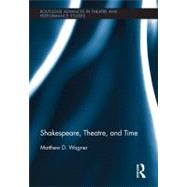- ISBN: 9780415805872 | 0415805872
- Cover: Hardcover
- Copyright: 8/25/2011
That Shakespeare thematized time thoroughly, almost obsessively, in his plays is well established: time is, among other things, a 'devourer' (Love's Labour's Lost), one who can untie knots (Twelfth Night), or, perhaps most famously, simply 'out of joint' (Hamlet). Yet most critical commentary on time and Shakespeare tends to incorporate little or no focus on time as an essential--if elusive--element of stage praxis. This book aims to fill that gap through an investigation of time in Shakespearean theatre. Wagner's focus is specifically performative, meaning he asks after time as a stage phenomenon rather than a literary theme or poetic metaphor; his primary approach is phenomenological, seeking to describe how time operates on Shakespearean stages. Wagner initially establishes the central argument that at the heart of theatrical time, and especially of Shakespearean time, lies temporal conflict and 'thickness' (the heightened sense of the present moment bearing the weight of both the past and the future). He then follows that argument--and some of its offshoots--through three interrelated perspectives: a study of the materiality of time in Elizabethan England, analyses of the performative qualities of time in four plays, and an examination of how the temporal characteristics of Shakespearean dramaturgy respond to the present-day theatrical 'norms' of realism and absurdism. Throughout the book, Wagner traces the ways in which time transcends thematic and metaphorical functions, and forms an essential part of Shakespearean stage praxis.







